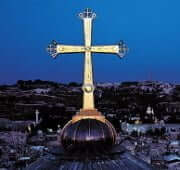
believers worldwide. They not only joyfully tell the story of Acts 2 (called by
some “the most-read chapter in the Bible”); they also experience the Holy Spirit
just as the early disciples did.
Fifty days after Jesus’ crucifixion, on the annual Jewish festival of
Pentecost in Jerusalem, God launched the church of Jesus Christ with a mighty
outpouring of His Holy Spirit. Here’s how the Bible describes the event:
“When the Day of Pentecost had fully come, they were all with one accord in
one place. And suddenly there came a sound from heaven, as of a rushing mighty
wind, and it filled the whole house where they were sitting. Then there appeared
to them divided tongues, as of fire, and one sat upon each of them. And they
were all filled with the Holy Spirit and began to speak with other tongues, as
the Spirit gave them utterance” (Acts 2:1-4).
This marvelous personal encounter is known as “the baptism with the Holy
Spirit,” and it is accompanied by the miracle of “speaking in tongues.” It
wasn’t for the disciples alone; you too can have this experience—your very own
Pentecost.
Before the feast of Pentecost, Jesus’ disciples had been praying in Jerusalem
for 10 days. They realized their situation was tenuous because Jesus had been
crucified there a month and a half before. However, they also remembered that,
on the night before He died, Jesus had announced His departure and promised to
send them the Holy Spirit as His replacement.
Forty days later (10 days before the day of Pentecost), the resurrected Jesus
appeared for the last time and affirmed His pledge. “And being assembled
together with them, He commanded them not to depart from Jerusalem, but to wait
for the Promise of the Father, ‘which,’ He said, ‘you have heard from Me; for
John truly baptized with water, but you shall be baptized with the Holy Spirit
not many days from now'”(Acts 1:4-5). Then they watched, dumbfounded, as He
physically ascended into the heavens.
Pentecost Then and Now
As the small band of Galileans continued their prayer vigil “continually in
the temple praising and blessing God” (Luke 24:53), a great tide of festive,
boisterous pilgrims pressed into the swollen city, happy to meet with friends
and worship at the glorious hub of Hebrew religion. Thousands began gathering
into the courtyards of the great Temple, a massive structure that could
accommodate 210,000 persons. Early Pentecost morning, 120 disciples were already
praying in Solomon’s Porch (or possibly the Court of the Women).
Suddenly three miracles commanded attention. The Spirit arrived—accompanied
by a howling wind, a blazing fire and miraculous tongues.
Imagine a wind of hurricane proportions, heard but not felt. “Suddenly” means
that God was moving and nothing could stop Him. The ruah, the “breath” of God
promised by Jesus, had arrived (see John 3:8; Ezek. 37).
With it came a sheet of fire that descended over the disciples. Quickly the
fiery mass divided into small flames that danced through the air, coming to rest
on the head of each one of the 120 followers of Jesus. This was not literal
fire, but “as of” or “like” fire, meaning it was absolutely real but also
uniquely divine.
The third miracle was an explosion of sound. The unscholarly Galileans began
speaking in more than a dozen known languages—although they had not learned
them—as if they were expert linguists. This was the first manifestation of
“speaking in tongues,” the phenomenon that Jesus said would occur among His
followers.
The disciples were not preaching in tongues but rather offering prophetic
worship. The people said, “‘We hear them speaking in our own tongues the
wonderful works of God'” (Acts 2:11). These worship acclamations not only
glorified God but also softened hearts for Peter’s subsequent message (like a
plow breaking up hard ground).
After the ruckus had somewhat subsided, Peter began to preach the good news
of Christ to the gathered crowd (probably in Aramaic, the common language).
Midway into his sermon, he proclaimed a classic Christian concept in simple
1-2-3 style: “‘Repent, and let every one of you be baptized in the name of Jesus
Christ for the remission of sins; and you shall receive the gift of the Holy
Spirit'” (Acts 2:38). Peter also had words for our generation: “‘For the promise
is to you and to your children, and to all who are afar off [the Gentiles], as
many as the Lord our God will call'” (v. 39).
The pattern Peter laid out in his message is a solid foundation for
incorporation into the body of Christ:
1. Be born again by faith in the Lord Jesus Christ.
2. Be water baptized.
3. Be baptized with the Holy Spirit.
Each of these three phases has a vital objective, and the Holy Spirit is very
much involved in each. Taken together as a whole they make up the introductory
essentials for serving the Lord: salvation, sanctification and equipping for
service. It is the last phase that is our current focus.
The wonderful experience of Spirit baptism is for those who already have
accepted Jesus Christ as their personal Savior and Lord. Conversion is, without
a doubt, accomplished by the power and presence of the Holy Spirit; but the
baptism with the Holy Spirit is a distinct infilling or empowering for service
that is subsequent to conversion.
The word “baptism” refers to immersion and is best illustrated by what
happens when a person is water baptized by dunking. “Spirit baptism” means that
a person is engulfed by, immersed in and filled with the Holy Spirit—like an
empty glass plunged into a tub of water.
Spirit baptism is a meaningful encounter with Christ that bonds the believer
to the same Spirit, experience and church that was birthed at Pentecost—and
helps him relate more deeply with Christ Himself. It accomplishes seven things
in his life: It makes Jesus more real, increases his spiritual sensitivity,
illuminates the Scriptures, provides the capability of praying “in the Spirit,”
brings sanctification, and allows for dynamic testimony and spiritual gift
manifestation.







Leave a Comment
You must be logged in to post a comment.